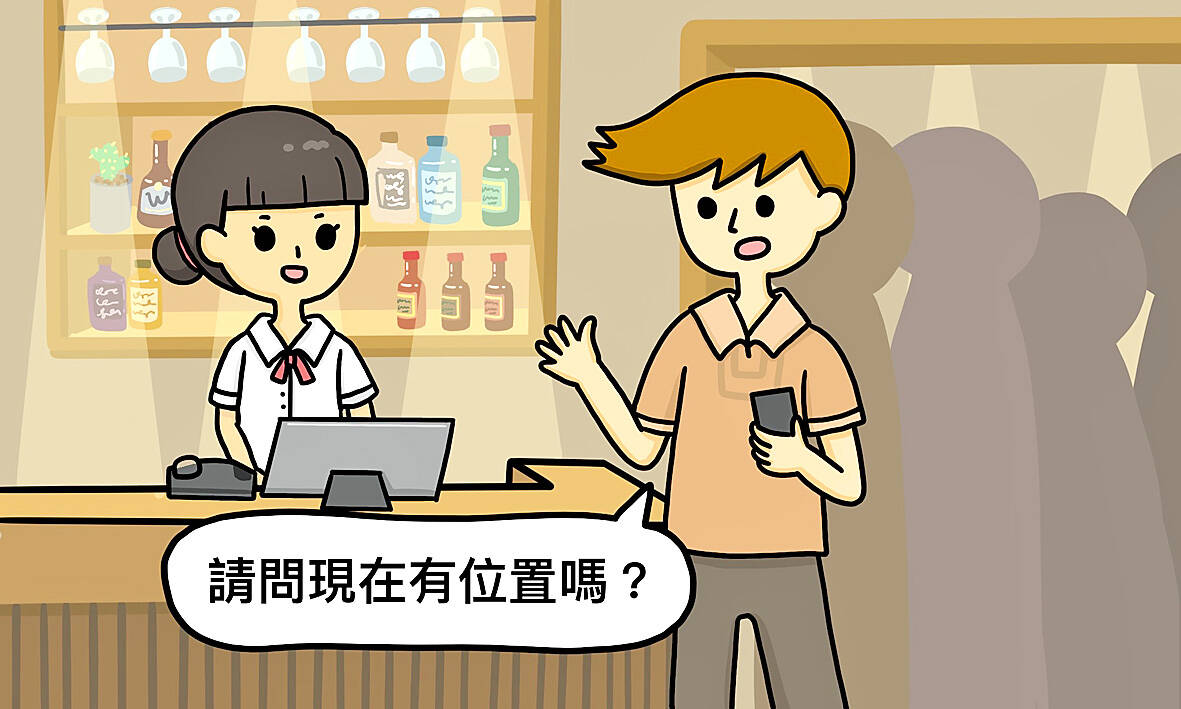對話 Dialogue
店員:歡迎光臨!
Dianyuan: Huānyíng guānglín!

馬克:你好,我們沒有訂位,請問現在有位子嗎?
Make: Nǐ hǎo, wǒmen méiyǒu dìngwèi, qǐngwèn xiànzài yǒu wèizi ma?
店員:目前我們客滿,可能要請您在門口排隊稍等哦。
Dianyuan: Mùqián wǒmen kèmǎn, kěnéng yàoqǐng nín zài ménkǒu páiduì shāoděng ó.
馬克:這樣啊……那請問大概要等多久?
Make: Zhèyàng a……nà qǐngwèn dàgài yào děng duōjiǔ?
店員:請問您有幾位用餐?
Dianyuan: Qǐngwèn nín yǒu jǐ wèi yòngcān?
馬克:我們有五個人。
Make: Wǒmen yǒu wǔ gerén.
店員:這樣為您安排六人桌,大概要等一個小時左右。
Dianyuan: Zhèyàng wèi nín ānpái liù rén zhuō, dàgài yào děng yíge xiǎoshí zuǒyòu.
馬克:哇?這麼久,那我們去別家餐廳吃吧。
Make: Wa? Zhème jiǔ, nà wǒmen qù bié jiā cāntīng chī ba.
店員:不好意思,歡迎下次提早來電訂位喔。
Dianyuan: Bùhǎoyìsi, huānyíng xià cì tízǎo láidiàn dìngwèi ō.
翻譯 Translation
Clerk: Welcome!
Mark: Hello, we don’t have a reservation. Are there any seats available now?
Clerk: We are full now, you may have to wait in line at the door.
Mark: Well... Then how long will it take?
Clerk: How many people are you?
Mark: There are five of us.
Clerk: It will take about an hour to arrange a table for six people for you.
Mark: Whoa? That’s a bit long, let’s go to another restaurant.
Clerk: Sorry, next time remember to call in advance to make a reservation.
單字片語 Vocabulary
1. 目前 (mùqián) at present
2. 客滿 (kè mǎn) full house
3. 排隊 (páiduì) wait in line
4. 稍等 (shāoděng) hold on
5. 大概 (dàgài) perhaps
6. 用餐 (yòngcān) to eat
7. 安排 (ānpái) arrange
8. 提早 (tízǎo) in advance
9. 來電 (láidiàn) call
教材音檔 Audio Files
教材影片 Video Files:
https://www.instagram.com/celc.nou_tw/guide/_/17999106352646292/
實踐大學華語中心提供
By Shih Chien University Chinese Language Center: https://chineseusc.com/

US President Donald Trump has renewed his ambition to take control of Greenland for national security reasons and questioned whether Denmark has any legal right to the Arctic island. The debate has revived scrutiny of how Greenland became part of Denmark, its current self-rule and path to independence, and Washington’s military footprint. HOW DID DENMARK GET GREENLAND? Greenland was inhabited by Inuit peoples from Asia and North America intermittently from around 2,500 BC. Around 985 AD, Vikings led by Erik the Red settled in southern Greenland, farming and building churches. Around the same time, ancestors of today’s Inuit arrived, living as hunters

Owls have long fascinated people with their distinctive appearance and mysterious habits. These nocturnal birds possess large, round eyes and a flat facial disc. Their feathers come in shades of brown, gray, or white, helping them blend easily into the darkness. The most remarkable trait of owls is that they can turn their heads without damaging blood vessels. Contrary to popular belief, they can only rotate their heads up to 270 degrees, not 360 degrees. Owls have 14 cervical vertebrae, which is twice as many as humans. This special physical structure compensates for their inability to move their eyes within their

A: Bloomberg just released its annual travel guide, titled “25 Best Places to Travel in 2026.” What were the best Asian destinations? B: There were actually six Asian hotspots: Taiwan’s Taipei, Malaysia’s Penang, Kazakhstan’s Almaty, Indonesia’s Rote Island, India’s Tiger Reserves, and Oman. A: With its mix of traditional food and modern cuisine, Taipei has become a rising food capital in Asia. B: As Bloomberg reported, “Taiwan is a place that bubbles up in culinary conversation because of its famed beverage, bubble tea, and its early adoption of modern night markets.” A: And Din Tai Fung has now

AI-generated summaries are shaking up the media world. Tools like Google’s AI Overviews now provide users with direct answers above the search results, resulting in fewer people clicking on news links. For publishers who rely on that traffic to generate advertising revenue, this shift is hitting hard. The fallout is measurable. Many sites have seen a sharp drop in traffic since AI summary features rolled out. An analysis revealed that a news outlet that had once ranked first on Google lost up to 79% of its traffic when its link appeared beneath an AI-generated summary. Statistics also show that